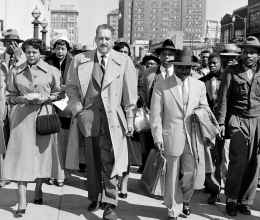
In 1966, Dr. Martin Luther King, Jr. and Coretta Scott King left their single-family home in Atlanta’s Vine City neighborhood and moved into an apartment on Chicago’s west side.
Their goal? To draw attention to the fight for equitable housing.
“If Martin Luther King, Jr. and his family moved into a slum area, I think even the media would begin to look at the slum area more closely,” said Coretta King.
The Fair Housing Act (FHA) had been introduced that same year and was championed by Dr. King. This civil rights legislation aimed to prohibit discrimination by landlords, real estate agents, and banks — but it was going nowhere fast in a country where exclusionary zoning laws and redlining had made legalized housing segregation as American as apple pie.
It was only after Dr. King’s assassination and a direct appeal from President Lyndon B. Johnson that the FHA was passed and signed into law days after Dr. King’s death. As one housing advocate said, “Fair housing was something that he literally died for.”
In the late 1960s, Dr. King and the civil rights movement had made open housing their priority because they understood that access to housing was itself a basic human right. They also knew that housing access was intertwined with dismantling other systemic inequalities like unequal access to education, racist and violent policing, and the racial wealth gap.
Today, in every state across the country, housing is once again the civil rights issue of our time.
Here in Fargo, the high prevalence of eviction rates and the devastating repercussions for renters and their families – including homelessness and poor health and education outcomes – is of growing concern. With COVID-era housing assistance resources drying up and issues with the former ND Rent Help Program dispensing American Rescue Plan dollars causing some landlords to be unwilling to take the money, eviction rates in Fargo are rising. In fact, 37 percent of eviction judgements in the state took place in Fargo and Cass County between January 2021 and October 2023.
While it is illegal to evict someone without going through housing court, this protection is meaningless if tenants have no legal support to fight their pending eviction. Unrepresented tenants generally cannot make legal arguments, raise applicable defenses, respond to or raise objections, introduce evidence, preserve issues for appeal or navigate the procedural obstacles of litigation. Nationally, representation in eviction cases is greatly imbalanced, with, on average, only 3% of renters having legal representation compared to more than 80% of landlords.
While shows like “Law and Order” taught us that “if you cannot afford a lawyer, one will be provided to you,” that only applies to criminal cases – not civil cases, like those involving evictions. Instead, states and cities decide whether to extend the right to counsel either through legislation or a court decision relying on the state’s constitution.
Providing counsel to renters is a crucial step for advancing due process and ending unjust evictions.
In New York City, which enacted the right to counsel for renters in 2017, 86% of renters with legal representation facing eviction remained in their homes, and eviction filings have declined by 30%.
But the right to counsel isn’t just good for tenants. When renters have legal representation, rental property owners are more likely to receive amounts due without costly collection efforts and renters are more likely to remain housed.
As Dr. King taught us, the housing crisis is, in fact, a civil rights crisis. And so is eviction. Ensuring a right to counsel for renters in eviction proceedings can play a vital role in helping to address systemic inequity and to continue to make Fargo a great place to call home.







